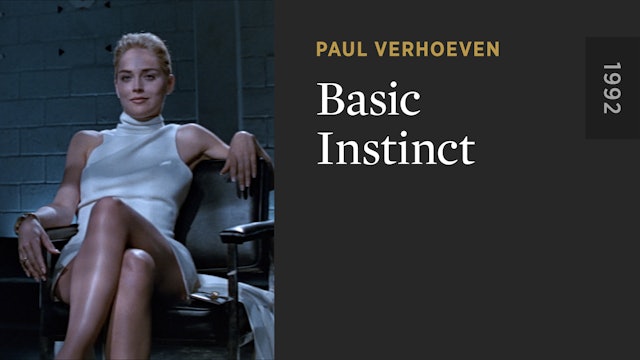It is odd that I never watched "Basic Instinct", despite all the exposure to its references and spoofs over the years, until I got back onto Criterion channel. Perhaps it is my deep fear or disturbance of "scary women". After watching it I can confirm that the main character Catherine, played by Sharon Stone, is indeed one of the scariest women on screen for perhaps three quarters of the movie. Near the end she switches to the manipulation mode and becomes much less scary. The last good scene is Catherine telling her lover, Nick, played by Michael Douglas, to get lost, now that she has finished her book. (Plot-wise, it is rather inconsistent, as Catherine continues to keep other murderers in her life. Why not Nick too?)
I can understand why some critics felt that Catherine is a male character dressed up as a woman, as cited by Karina Longworth in her fascinating You Must Remember This podcast. However, I have the feeling of watching a strange international mashup on screen: a love affair between a Dutch woman and an American man. Disclaimer: I know zero Dutch person in real life. The closest I have gotten to the Dutch culture is limited to superficially meeting a couple of Flemish persons, who would be the first to point out their difference from the Dutch. Nevertheless, Dutch women have a reputation of being one of the most powerful and aggressive groups of women in the world --- Well, who am I kidding, the reputation of Dutch women is that they are the most like men.
On the other hand, Michael Douglas derived his popularity from embodying the quintessential American white men of the Reagan era. So the power dynamic between a European woman and an American man is so potent that, now, 30 years after the fact but on my first viewing, I see this movie as an allegory of the cultural dialog between Europe and United States, or perhaps simply the Netherlands and US, as presented by Paul Verhoeven.
Verhoeven made several hits in Hollywood in the 80s and 90s that are more or less considered satires of the American culture. Robocop is a more explicit satire about the power of corporations and privatization of everything (which proves to be prescient). Starship Troopers is a more subtle spoof of the military and patriotism propaganda. Basic Instinct transparently makes fun of the Puritanical attitude toward sex that is particular to the American culture. (This satire also proves to be prescient for the direction of Hollywood movies in the next 30 years.)
Of course, American audience automatically identifies with Douglas' character, as he is the point-of-view character, and laments his diminished power/dominance in this relationship, and their disorientation has to be soothed by the absurd but more American relationship between Nick and his psychologist Beth, played by Jean Tripplehorn. However, a closer look at Nick suggests that he does not fit the trope of heroic cop that floods American movies and TV. His history of killing not only drug dealers but innocent bystanders is repeatedly brought up and never justified. It is curious and revealing that neither the American audience nor critics ever found that to be a defining trait of the character. Again history confirms the acuity of this observation about the American culture, which echoes the excessive violence in Robocop. Nick is a violent man who is in this job for the privilege of killing people (and getting away with it, as the dialog reminds us), and he does eventually shoots dead his ex-lover (perhaps representing the moviegoing American public), while his victim's last words were "I love you" (I guess she represents American white women?). Thus, he belongs in Catherine's menagerie of blood-thirsty killers.
The simultaneous aggression and submission of this character make it a study in the American masculinity, which can be observed generally in the concurrence of excessive violence and sexual prudishness in American movies. The hilarious "happily ever after" ending may seem stupid but is necessary to protect the audience from facing the uncomfortable death of the American Man. Nevertheless, Nick's obliviousness in that scene carries the allegory to the end.


No comments:
Post a Comment